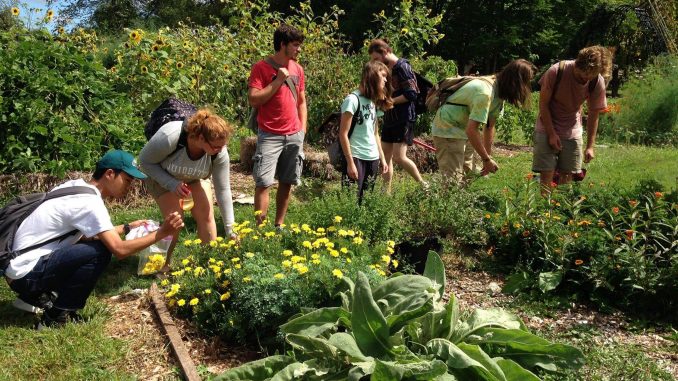
Students on Ambler Campus have been planting, weeding and harvesting medicinal herbs in its new botanical garden this semester.
The garden is part of Temple’s new “Botanical Traditions” class, offered for the first time this fall at Ambler Campus.
“Botanical Traditions” is an elective in the landscape, architecture and horticulture program, which is now a division of Architecture and Environmental Design at Tyler School of Art. The horticulture program is mainly taught on Temple’s 187-acre arboretum on Ambler Campus.
Charlene Briggs, an adjunct professor in the department of Landscape Architecture and Horticulture at Temple’s Ambler Campus, teaches the class and works with students on how to identify and prepare plants that have traditionally been used to make food, medicines and dyes.
“Students will learn how to grow the plants, harvest them and use them, so they can do this at home in their own garden,” Briggs said.
Briggs has been practicing botanical medicine for more than 35 years and has her own integrative medicine practice called Botanical Energetics.
She was inspired to develop the class after a push from honors students in Temple’s civil and environmental engineering department, who were excited to learn more about the traditional uses of plants.
Temple’s “Botanical Traditions” class is one of a small number of university herbal programs offered throughout the country, Briggs said.
The class also puts a focus on safety.
“Just because it’s an herb and it’s natural doesn’t mean it’s safe,” Briggs said. “We have a focus on how to identify a plant and make sure we know what it is.”
Students need to check several sources and be 100 percent sure of a plant’s identity before preparing anything from it, she said.
The class is timely because there is a renewed interest in bringing integrative, holistic medicine in the United States, Briggs said.
“People have used plants for food and medicine forever. Eighty percent of people in the world still use plants for their major mode of healing,” Briggs said. “We’ve gotten away from that in this culture.”
Students will be making medicinal preparations, food and dyes from the plants in the 35-by-16 foot garden that Briggs constructed herself this past June.
Motherwort, mint and rosemary are some of the medicinal herbs growing in the garden right now. The garden has plants for every system of the human body, Briggs said. Students will be designing the garden and planting more medicinal plants throughout the semester.
“The course is really about holistic medicine,” Briggs said. “There is no reason why herbal medicine can’t be used side-by-side with conventional medicine, as long as you have trained practitioners in it.”
Nicole Toro, a junior horticulture major, took the class because of her interest in holistic alternatives to modern medicines, she said.
“I’m skeptical of modern medicine and I was really interested in knowing about safer, more natural alternatives to pharmaceutical medicines that can have a lot of side effects,” said Toro, who suffers from migraines. “I am really looking at the holistic side of everything.”
For junior horticulture major Marla Cornwell, the course has inspired a career path.
“Before I took the class, I was trying to figure out which avenue of horticulture I wanted to go down,” she said. “I really think this is where I’d like to go, helping people with the connection of plants and how much they can do for us.”
Students will be adding to the garden throughout the semester and it will eventually expand to 35 feet by 85 feet.
Later in the semester, a field trip is planned for Barefoot Gardens, a working herb farm near Doylestown, where students will learn about harvesting, drying and processing herbs for market.
“Everything is totally hands on,” Briggs said. “We are working with the plants and outside every class.”
Currently, the class has only one section, which is offered in the fall semester due to weather and seasonal harvesting of flowers and herbs, which are in full bloom this time of year, but Briggs said she hopes to expand to spring in the future.
“My students are learning how to be agents for change starting with their own lives and extending that wisdom to the community and world.”
Jennifer Klimowicz can be reached at jennifer.klimowicz0001@temple.edu.


My brother suggested I would possibly like this website. He was once entirely right. This post truly made my day. You cann’t believe simply how so much time I had spent for this info! Thanks!